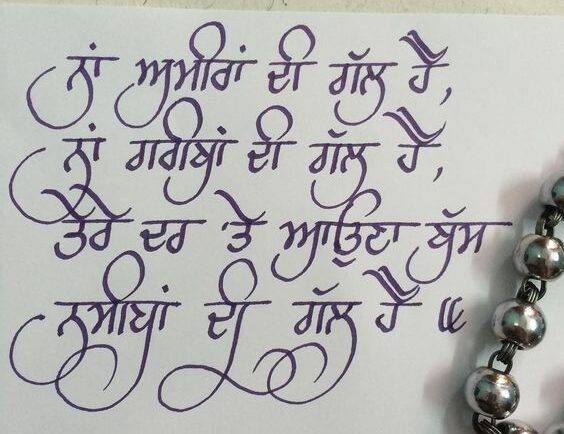AI Generated Summary
- The Gurmukhi script not only became the primary vehicle for the poetic and spiritual expressions of the Sikh Gurus in the Guru Granth Sahib, the holy book of Sikhism, but it also played a crucial role in preserving the rich Punjabi literature and folklore.
- Each letter is carefully crafted, ensuring that the thickness of the strokes, the angles, and the spaces between the characters are in perfect balance, resulting in a captivating visual rhythm.
- Modern calligraphers and typographers have harnessed the power of technology to create digital fonts and typefaces based on traditional Gurmukhi script, making it more accessible to a global audience.
Punjab boasts an art form that combines both visual and literary beauty – Calligraphy. At the heart of this artistic tradition lies the Gurmukhi script, an alphabetic system that has been used to pen Punjabi literature for centuries. The art of Punjabi calligraphy goes beyond mere words; it is a visual symphony of letters that captures the essence of Punjab’s spirit and soul.
Historical Significance of Gurmukhi Calligraphy
The Gurmukhi script, which literally means “from the mouth of the Guru,” was developed in the 16th century by the second Sikh Guru, Guru Angad Dev Ji. It was intended to provide the Punjabi people with an accessible and standardized writing system for their native language. The Gurmukhi script not only became the primary vehicle for the poetic and spiritual expressions of the Sikh Gurus in the Guru Granth Sahib, the holy book of Sikhism, but it also played a crucial role in preserving the rich Punjabi literature and folklore.
The art of Punjabi calligraphy in Gurmukhi script flourished alongside the literary and spiritual traditions it documented. Calligraphers dedicated their lives to mastering the nuances of the script and creating visually stunning manuscripts, imbuing each stroke with a sense of devotion and reverence.
Connecting Gurmukhi and Calligraphy
Calligraphy, an art form that transforms words into visual masterpieces, has been practiced in various cultures around the world. In the context of Punjabi calligraphy, the Gurmukhi script lends itself beautifully to this art form, with its elegant curves and distinctive characters.
The Gurmukhi calligraphers employ meticulous techniques and an exceptional level of craftsmanship to create harmonious compositions. The use of traditional tools such as bamboo and reed pens, inkwells, and handmade paper adds to the authenticity of the art form. Each letter is carefully crafted, ensuring that the thickness of the strokes, the angles, and the spaces between the characters are in perfect balance, resulting in a captivating visual rhythm.
Contemporary Revival Efforts
In recent years, there has been a resurgence of interest in Punjabi calligraphy, as artists and enthusiasts seek to preserve and promote this traditional art form. Workshops and exhibitions dedicated to Punjabi calligraphy have been organized across Punjab and beyond, helping to generate awareness and appreciation for the art.
Digital technology has also played a pivotal role in the revival of Punjabi calligraphy. Modern calligraphers and typographers have harnessed the power of technology to create digital fonts and typefaces based on traditional Gurmukhi script, making it more accessible to a global audience.
Moreover, the Punjabi diaspora has played a significant role in preserving and promoting Gurmukhi calligraphy. Many artists, hailing from Punjab and now residing in different parts of the world, have continued to practice and teach the art form, ensuring that this cultural treasure endures for future generations.
The art of Punjabi calligraphy is a testament to the region’s rich literary and cultural heritage. The Gurmukhi script, with its elegant form and historical significance, provides a canvas for calligraphers to create visually stunning compositions. As contemporary artists and enthusiasts continue to explore and celebrate this artistic tradition, the visual symphony of Punjabi calligraphy will continue to resonate across the world.




